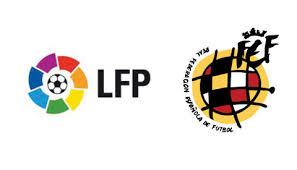By Andrew Warshaw
May 7 – Spanish football has burst into outright warfare over plans to introduce the sale of centralized tv rights from 2016. The Spanish football federation has indefinitely suspended competition from May 16 in a dispute with the government over a new law on collective bargaining, effectively halting the final two rounds of La Liga and the rest of domestic football.
That, in turn, has led Spain’s professional league (LFP) to begin legal action to try and block the suspension.
The new legislation was signed off last week and aims to create a more level playing field in Spain’s top two divisions by sharing out cash more evenly and preventing clubs getting into dire financial straits as they aim to compete.
However, the federation and its long-standing president, FIFA powerbroker Angel Maria Villar, as well as the players’ union, are strongly against the plans.
If the suspension goes ahead, the final two weekends in La Liga would be hit as would the national King’s Cup final between Barcelona and Athletic Bilbao at the end of the month. Altogether some 17 regional federations could be hit, apparently involving up to 30,000 matches and 600,000 players.
In a statement late on Wednesday, the LFP, which has called an extraordinary general assembly of the 42 professional clubs in the top two divisions for Monday, said the federation’s move was legally “invalid” and that it had initiated “the appropriate action with the pertinent administrative and legal bodies” to overturn it.
“The LFP wishes to reiterate the importance of the royal decree approved by the Spanish government and emphasise its importance as an historic milestone for Spanish soccer,” the statement added.
But after a board meeting on Wednesday, the Spanish federation (RFEF) hit back by accusing the government of a “lack of respect” and complained it had not been consulted properly.
Lurking in the background is the response of FIFA and UEFA who both prohibit government interference in football. It will be interesting to see what action, if any, the two bodies take over what is essentially a commercial dispute.
The new regulations will replace the current system under which rights are sold by individual clubs and could lead to a sharp price increase for broadcasters once it takes effect from the 2016-17 season. The status quo heavily favours Real Madrid and Barcelona and hits poorer teams who have called for years for a fairer system of sharing the TV cash.
The new law was discussed at length during this week’s Soccerex Asian forum in Jordan, not least the fact that Barca and Real benefit from managing their own tv rights by a ratio of 7:1 over the rest.
Miguel Cardenal, the head of Spain’s sports council, says the changes will allow the country to “adapt to modern times” and fall into line with elite leagues in nations like England and Italy.
“The club who came last in the English Premier League earned more from television than [defending Spanish champions] Atletico Madrid,” he pointed out.
Contact the writer of this story at moc.l1745016928labto1745016928ofdlr1745016928owedi1745016928sni@w1745016928ahsra1745016928w.wer1745016928dna1745016928

